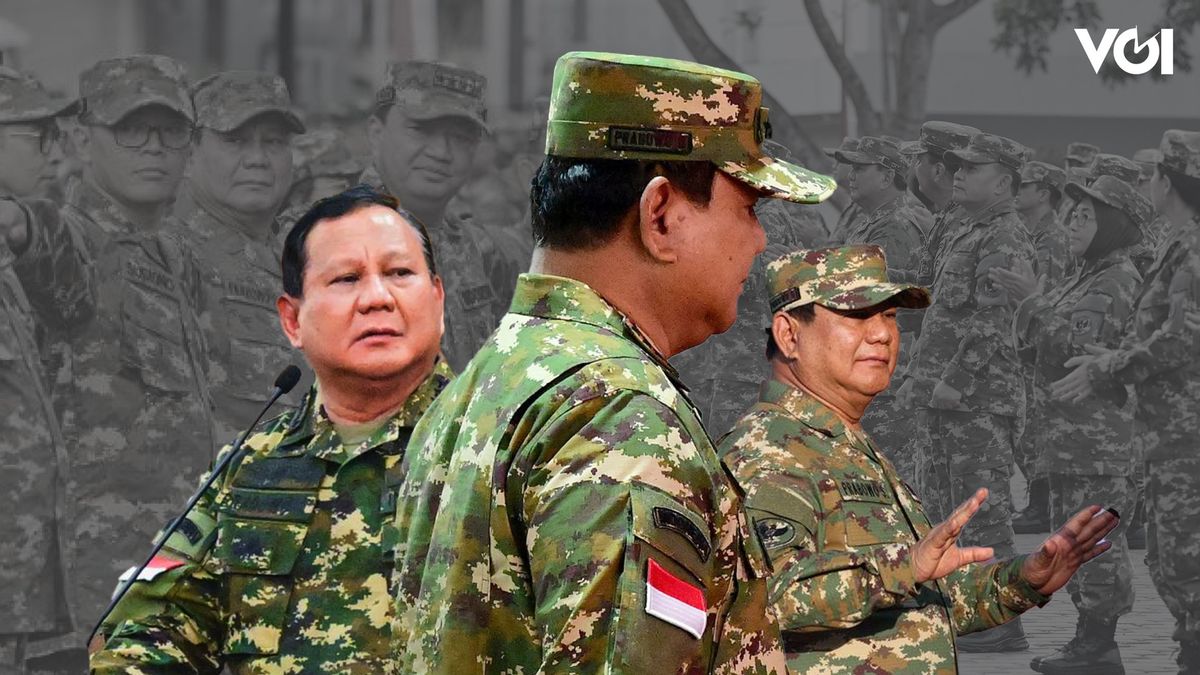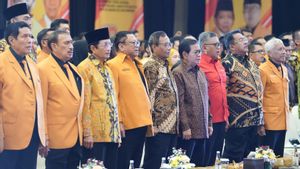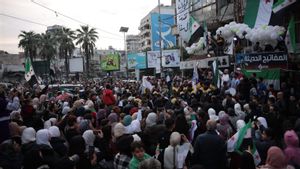JAKARTA – President Prabowo Subianto held a retreat for all members of the Red and White Cabinet (KMP) at the Military Academy, Lembah Tidar area, Magelang, Central Java. This does not mean militaristic, the retreat for KMP personnel is to establish synergy and togetherness in facing the challenges of the Prabowo-Gibran government for the next five years.
In his statement, the Head of the Presidential Communications Office, Hasan Nasbi explained that the series of retreat events including the marching of KMP members can be symbolized to align the frequency and steps of the government going forward.
“We must move in tune with the same goal. The government does not work alone, but as a team. In addition, KMP members must also reflect on the togetherness of a football team, where all players must have the same beliefs and goals,” he said, Friday, October 25, 2024.
Indeed, the challenges that Prabowo's government will face are not trivial, especially in the economic sector. As is known, Prabowo in the 2024 presidential election campaign had Asta Cita or eight leading government programs. Of the eight programs, five are related to economic issues. This indicates that the economic sector is Prabowo's concern.
In terms of macroeconomics, the Prabowo government will face a major challenge in managing the budget deficit which is projected to reach IDR 616 trillion in 2025. This deficit is a direct impact of the aggressive fiscal policy implemented by the previous government.
Legal observer and anti-corruption activist, Hardjuno Wiwoho said, this budget deficit is an accumulation of debt taken during President Joko Widodo's term to finance various strategic infrastructure projects. Although successful in driving the economy, the debt burden borne is quite large.
The 2025 State Budget (APBN), which was ratified on October 17, 2024, has estimated a budget deficit of IDR 616 trillion. Most of this deficit is covered through debt financing of IDR 775 trillion, which is a consequence of the previous debt policy.
"This is not a policy that can be changed immediately. President Prabowo inherited a fiscal situation that was already full of debt pressure. Although he started managing the budget in 2025, the policies made by the previous government still greatly affect the fiscal room for maneuver of the new government," explained Hardjuno.
Nevertheless, he is optimistic that the Prabowo government will be able to take careful steps to overcome this situation. For example, at the first cabinet meeting after being inaugurated, Prabowo emphasized the importance of more careful financial management, especially regarding supervision of potential budget leaks and corruption.
In addition, Prabowo also emphasized the importance of strengthening state financial supervision in an effort to manage the deficit and debt. "This is an important step to reduce the country's fiscal burden which is getting heavier due to old debts. Development programs will continue to run, but with strict supervision so that there are no budget leaks," added Hardjuno.
He emphasized that the Prabowo government must also balance deficit financing with the need to maintain economic growth and protect the interests of the people. One step that can be taken is to ensure investment in the productive sector and maintain the efficiency of state spending.
Poverty and Unemployment Become Government Challenges in the Real Sector

In terms of the real sector, economic policy analyst for the Indonesian Employers' Association (Apindo), Ajib Hamdani, revealed that there are several fundamental economic challenges that the future government must face. One of them is the still high unemployment rate. IMF data as of April 2024 recorded that Indonesia's unemployment rate reached 5.2 percent. Compared to ASEAN countries, Indonesia's unemployment rate is in first place.
"The achievement of investment that has always been over target for the past five years cannot be the main solution to absorb more workers," he said.
In fact, in recent years there has been a paradox where there have been more layoffs (PHK) at a time when the incremental capital-output ratio (ICOR) continues to increase. This means that investment has decreased in its contribution to economic growth.
Another problem that the Prabowo government must face is poverty. The Central Statistics Agency (BPS) noted that the number of poor people in Indonesia reached 9.03 percent or 25.22 million people as of March 2024. However, other facts state that the poor community group that is the recipient of BPJS Kesehatan's central contribution assistance (PBI) has reached more than 96 million people.
Ajib hopes that the government will really push for policies that are pro-equity and encourage poverty reduction. With more than 60 percent of gross domestic product (GDP) supported by household consumption, economic growth will be sustainable if poverty can continue to be reduced and people's purchasing power increased.
"This means that the government must also be observant with initial data as a foundation for future policies. There are still many who are burdened with the size of this poor community, whether 25 million or 96 million people," he added.
UI economist, Teguh Dartanto also hopes that the Prabowo government can prepare solutions in responding to several economic challenges that will occur. Although currently, Indonesia's economic conditions are considered still good and stable. According to him, the government must prepare steps to overcome problems such as deflation (price decline) and layoffs.
"Strategic steps are needed to respond to deflation for five consecutive months, a decline of around 9.5 million middle class people, layoffs, and added conditions of uncertainty abroad. It is better to be vigilant than to be complacent," he said.
He explained that in September 2024, BPS recorded that Indonesia's deflation reached 0.12 percent. This deflation is the fifth in a row throughout the current year. This is also the worst in the last five years of President Joko Widodo's administration.
Due to this deflation, the income or money indicators in the community are getting smaller or their income is decreasing. He revealed that one of the drivers was layoffs (PHK) in a number of regions.
Data from the Ministry of Manpower recorded around 53,993 workers were laid off as of October 2024, where most of them occurred in the manufacturing industry with three provinces recording the largest numbers, namely Central Java, Banten, and Jakarta.
"In addition, the number of middle-class people who are always proud of as one of the economic advances has also decreased. BPS noted that the percentage of the middle-class population based on expenditure has decreased from 21.4 percent in 2019 to 17.1 percent in 2024," explained Teguh.
He said that the provision of social assistance funds is still needed not only for the lower economic groups, but also for the middle class who have been laid off so that they do not fall into poverty. "The new government should not make many unrealistic promises and make various unproductive statements. In addition, the government must quickly provide solutions to the decline in the number of the middle class and also middle-class protests with realistic programs," said Teguh.

The economic challenges in the real sector above are in accordance with the results of the latest LSI Denny JA survey which revealed that there are two economic problems that are the main challenges for President Prabowo Subianto's government. The survey results show that 65 percent of the public find it increasingly difficult to get jobs.
"As many as 65 percent of the public stated that jobs or employment are increasingly difficult to obtain. Of course, this is a major challenge for the future government in terms of how to create wider employment opportunities," said SIGI LSI Denny JA Director, Ardian Sopa.
Furthermore, 64 percent of survey respondents stated that fulfilling basic needs is increasingly difficult. "As many as 64 percent of the public stated that fulfilling basic needs is increasingly difficult," said Ardian.
One of the real challenges that the Prabowo government must face is related to the status of PT Sri Rejeki Isman Tbk or Sritex (SRIL). The largest textile factory in Southeast Asia was declared bankrupt by the Semarang Commercial District Court on October 21, 2024, as stated in the case decision number 2/Pdt. Sus Homologasi/2024/PN Niaga Smg.
Sritex company management revealed that the number of employees in the Sritex group is currently 50,000, of which 14,112 employees will be directly affected by the bankruptcy decision. A thumbs up should be given to President Prabowo. Because, he immediately moved quickly by instructing four ministries to collaborate in preparing a rescue scheme for Sritex in order to maintain workforce stability and avoid mass layoffs.
The four ministries involved in this rescue effort are the Ministry of Industry, Ministry of Finance, Ministry of SOEs, and Ministry of Manpower. These four ministries are working together to formulate a solution to maintain Sritex's operations so that the company can continue to operate and protect employee rights.
In his written statement, Saturday, October 26, 2024, Minister of Industry Agus Gumiwang Kartasasmita emphasized that this effort is a government priority, considering that Sritex is an important pillar in the national textile industry and plays a major role in absorbing the workforce.
He explained that the Ministry of Finance also plays a role in reviewing possible financial support, while the Ministry of SOEs will identify the possibility of SOE involvement in rescuing Sritex. On the other hand, the Ministry of Manpower is focused on the aspect of labor protection and ensuring that employee rights are met during the restructuring period.
"We will immediately finalize the necessary steps and provide recommendations so that the policies taken can have a positive impact on labor stability and company sustainability," said Gumiwang.
With the completion of the KIM members' retreat, the public is now certainly waiting to see whether the event in Lembah Tidar is able to answer the challenges of the elite, aka the difficult economy during the Prabowo Subianto administration. Closest, of course, is the luck of Lembah Tidar able to at least save thousands of Sritex employees from the threat of layoffs, or instead increase the number of unemployed and poverty rates.
The English, Chinese, Japanese, Arabic, and French versions are automatically generated by the AI. So there may still be inaccuracies in translating, please always see Indonesian as our main language. (system supported by DigitalSiber.id)













